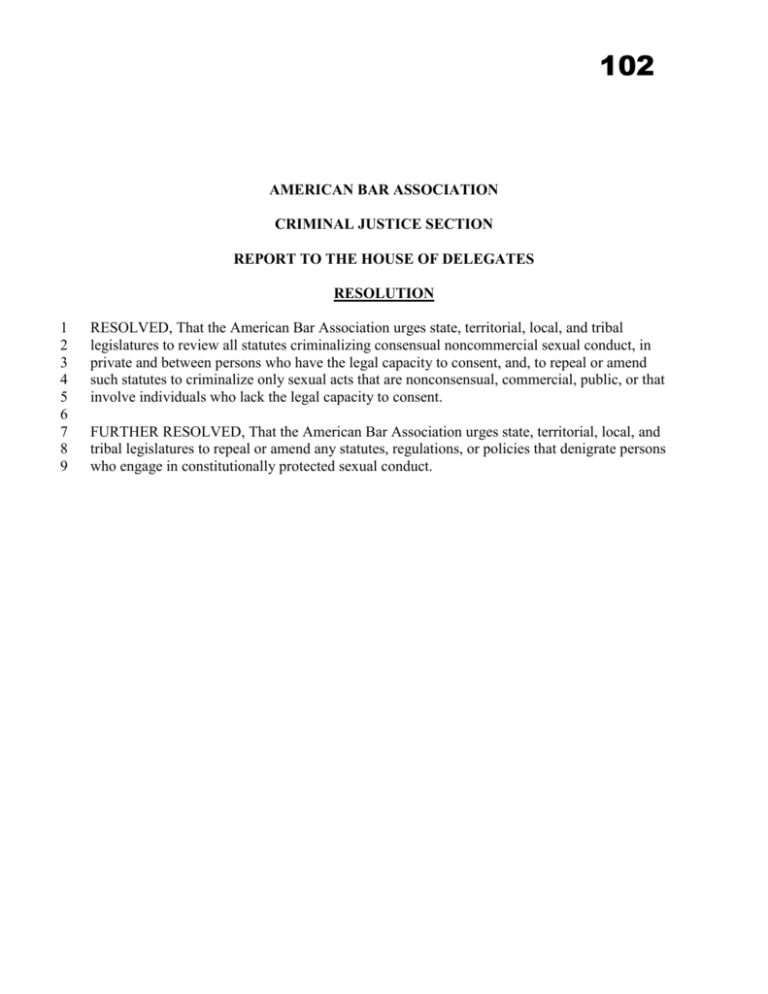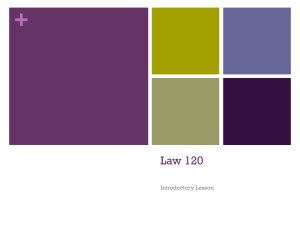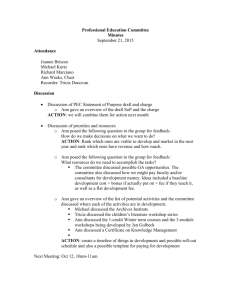
102
AMERICAN BAR ASSOCIATION
CRIMINAL JUSTICE SECTION
REPORT TO THE HOUSE OF DELEGATES
RESOLUTION
1
2
3
4
5
6
7
8
9
RESOLVED, That the American Bar Association urges state, territorial, local, and tribal
legislatures to review all statutes criminalizing consensual noncommercial sexual conduct, in
private and between persons who have the legal capacity to consent, and, to repeal or amend
such statutes to criminalize only sexual acts that are nonconsensual, commercial, public, or that
involve individuals who lack the legal capacity to consent.
FURTHER RESOLVED, That the American Bar Association urges state, territorial, local, and
tribal legislatures to repeal or amend any statutes, regulations, or policies that denigrate persons
who engage in constitutionally protected sexual conduct.
102
REPORT
In 1973, the House of Delegates approved the recommendation submitted by the
Section of Civil Rights and Social Justice (formerly Individual Rights and
Responsibilities) urging the legislatures of the several states to repeal all laws classifying
consensual, private, noncommercial adult sexual conduct as criminal.1 Today, the
Criminal Justice Section reiterates its commitment to personal privacy and again urges
state legislatures to update their criminal laws to make explicit the protections that courts
and attorneys general have concluded private adults are afforded, while maintaining
statutes narrowly crafted to protect public decorum and minors below the age of consent,
and to prevent prostitution and forced sexual contact. Specifically, the Section references
statutes that purport to criminalize oral and anal sex (“anti-sodomy statutes”); which
define oral and anal sex in pejorative terms; which prohibit unmarried persons from
engaging in consensual sex (“anti-fornication statutes”); or which require – often in
tandem with anti-sodomy statutes – that public schools teach that homosexuality is
immoral or criminal.
The Supreme Court of the United States held twelve years ago in Lawrence v.
Texas that the Due Process Clause of the Fourteenth Amendment protects the
fundamental privacy right of all persons to engage in consensual sexual activity with
another adult in private, regardless of the genders of the participants.2 In so holding, the
Court made clear that state laws are valid where they protect children, prevent public
sexual conduct, outlaw prostitution, and punish forcible or coerced sexual conduct,
stating:
The present case does not involve minors. It does not
involve persons who might be injured or coerced or who
are situated in relationships where consent might not easily
be refused. It does not involve public conduct or
prostitution. It does not involve whether the government
must give formal recognition to any relationship that
homosexual persons seek to enter. The case does involve
two adults who, with full and mutual consent from each
other, engaged in sexual practices common to a
homosexual lifestyle. The petitioners are entitled to respect
for their private lives. The State cannot demean their
existence or control their destiny by making their private
sexual conduct a crime. Their right to liberty under the Due
1
Report No. 2 of the Section of Individual Rights and Responsibilities, Recommendation, August 1973.
2
Lawrence v. Texas, 539 U.S. 558, 575 (2003) (“Were we to hold the statute invalid under the Equal
Protection Clause some might question whether a prohibition would be valid if drawn differently, say, to
prohibit the conduct both between same-sex and different-sex participants.”).
1
102
Process Clause gives them the full right to engage in their
conduct without intervention of the government. “It is a
promise of the Constitution that there is a realm of personal
liberty which the government may not enter.” Casey, supra,
at 847, 112 S.Ct. 2791. The Texas statute furthers no
legitimate state interest which can justify its intrusion into
the personal and private life of the individual.3
In Lawrence, the Court came to a realization that the rest of the country had been
moving toward for decades – that private and intimate sexual conduct between
consenting adults falls outside the state’s power to criminalize. The Section’s 1973
Recommendation was appended to the American Bar Association’s amicus brief to the
Lawrence Court, noting that the American Legal Institute’s Model Penal Code omitted
such offenses, which did not harm others, which undermine respect for law enforcement,
and which are prone to arbitrary enforcement.4 The Court cited these rationales in its
opinion,5 which are no less true today than they were in 1955 when the ALI removed
these provisions from the Code.
Whereas all fifty states outlawed sodomy in 1961, only twenty-five did so in 2003
when Justice Kennedy wrote for the Court in Lawrence,6 and only eighteen states retain
such provisions in their current criminal codes. These statutes have been declared
unenforceable in twelve of these states,7 and are of doubtful application in the remaining
3
Lawrence v. Texas, 539 U.S. 558, 578 (2003).
4
Brief of the American Bar Association as Amicus Curiae in Support of Petitioners, Lawrence v. Texas,
539 U.S. 558, 578 (2003), Appendix A, “Official Policies and Constitutional Amendments of the
American Bar Association,” at p. 12a [hereinafter “1973 Recommendation”].
5
Lawrence, 539 U.S. at 572.
6
Id. at 572-73.
7
Ala. Code § 13A-6-60(2); Doe v. Pryor, 344 F.3d 1282, 1283 (11th Cir. 2003) (noting that Alabama
Attorney General recognized anti-sodomy statute as unenforceable post-Lawrence); Ga. Code Ann. § 166-2(a)(1); Powell v. Georgia, 510 S.E.2d 18, 26 (Ga. 1998) (limiting application of Georgia statute under
state constitution); Idaho Code Ann. § 18-6605; Cook v. Reinke, 484 F. App'x 110, 111 (9th Cir. 2012)
(recognizing limited application of Idaho statute after Lawrence); Kan. Stat. Ann. § 21-5501(b); Kansas
v. Franco, 319 P.3d 551 (Kan. Ct. App. 2014) (limiting application of Kansas statute under Lawrence);
Ky. Rev. Stat. Ann. § 510.100; Com. v. Wasson, 842 S.W.2d 487, 501–02 (Ky. 1992) (declaring
Kentucky statute unconstitutional under due process and equal protection analyses); La. Rev. Stat. Ann.
§ 14:89(A); Louisiana Electorate of Gays & Lesbians, Inc. v. Connick, 902 So. 2d 1090, 1095 (La. Ct.
App. 2005), writ denied, 916 So. 2d 1062 (La. 2005) (constraining application of Louisiana statute); Md.
Code Ann., Crim. Law §§ 3-321, 3-322; Conaway v. Deane, 932 A.2d 571, 642–43 (2007) (recognizing
Maryland courts’ abrogation of state statutes pre-Lawrence); Mass. Gen. Laws Ann. ch. 272, §§ 34-35;
Gay & Lesbian Advocates & Defenders v. Attorney Gen., 763 N.E.2d 38, 40 (Mass. 2002) (constraining
scope of Massachusetts statutes); Minn. Stat. Ann. § 609.293; Doe v. Ventura, 2001 WL 543734 (Minn.
Dist. Ct. May 15, 2001) (limiting reach of Minnesota statute); N.C. Gen. Stat. Ann. § 14-177; North
Carolina v. Whiteley, 616 S.E.2d 576, 580–81 (NC App. Ct. 2005) (limiting application of North
Carolina statute under Lawrence); Okla. Stat. Ann. tit. 21, § 886; Post v. Oklahoma, 715 P.2d 1105,
2
102
six.8 Furthermore, the Uniform Code of Military Justice was recently amended to de-list
consensual oral or anal sex from the list of offenses, and to ensure punishment only for
forcible acts.9 This is an important step toward every adult’s freedom from government
intrusion into his or her private sexual expression with other adults, and freedom from the
criminal stigma that attaches to prosecution for one’s intimate sexual conduct.
Yet, despite this constitutionally recognized right, and despite the
unenforceability of these statutes, they remain in place in eighteen states, which leads to
stigmatization, harassment, and a series of collateral consequences. A related specie of
statute, the anti-fornication statute, remains among the criminal codes of eight states,
outlawing sexual intercourse between unmarried persons. Taken together, these state
statutes restraining individual freedoms conflict with the U.S. Constitution, and with state
constitutions throughout the country. They should be amended or repealed to conform
with Lawrence, for the reasons stated by the Supreme Court, the reasons expressed in this
Section’s 1973 Recommendation, and the reasons that follow.
First, the fact that anti-sodomy statutes remain “on the books” perpetuates the
stigmatization of gay and bisexual individuals, against whom these statutes have
historically been disproportionately enforced.10 Even where courts and attorneys general
have deemed these laws unconstitutional or unenforceable, the unabridged statutes
remain accessible to lay readers through libraries and state legislatures’ websites. The
effect of this is to suggest to the lay reader that certain actions are prohibited, or that
certain persons engaging in such behavior have committed a criminal infraction. Further,
even for those who know that a particular state’s courts have addressed the enforceability
of an anti-sodomy statute, the fact of the legislature’s refusal – whether active or passive
1109 (Okla. Crim. App. 1986) (holding that Lawrence limits application of Oklahoma statute as applied
to heterosexual conduct, but declining to opine on application to same-sex conduct); Tex. Penal Code
Ann. § 21.06; Lawrence v. Texas, 539 U.S. 558, 578 (2003) (holding Texas statute unconstitutional).
8
Cal. Penal Code §§ 286, 288a, 4504(b) (prohibiting certain sexual conduct among persons “in
confinement,” which may have some application to private, consensual, adult sexual activity taking place
outside of a penological institution in California); Fla. Stat. Ann. §§ 800.01, 800.02; Franklin v. State,
257 So. 2d 21, 23–24 (Fla. 1971) (declaring one, but not the other, Florida anti-sodomy statute
unconstitutionally vague); Mich. Comp. Laws Ann. §§ 750.158, § 750.338, 750.338a, 750.338b;
Michigan v. McPhee, 2007 WL 912116 (Mich. Ct. App. Mar. 27, 2007) (declining to address
constitutionality of Michigan statute, contrasting situation in Lawrence with situation at bar, where adult
male forced sexual contact upon his intoxicated minor sister-in-law); Miss. Code. Ann. § 97-29-59
(criminalizing “the detestable and abominable crime against nature” in Mississippi); S.C. Code Ann. §
16-15-120 (prohibiting “buggery,” undefined by South Carolina law); Utah Code Ann. § 76-5-403;
Berg v. Utah, 100 P.3d 261 (Utah Ct. App. 2004) (constitutional challenge to Utah statute dismissed for
lack of standing).
9
10 U.S.C. § 925(a) (2014); National Defense Authorization Act for Fiscal Year 2014, Pub. Law No. 11366, at § 1707 (repealing Uniform Code of Military Justice offense of consensual sodomy).
10
1973 Recommendation at p. 12a.
3
102
– to repeal the statute suggests an endorsement of an anti-sodomy policy even for conduct
that is not criminally prosecutable.11
The highest profile incidence of the refusal to amend an anti-sodomy statute may
be Virginia, due to the media attention focused on Ken Cuccinelli in 2013. Cuccinelli, as
a Virginia state legislator, had voted against updating Virginia’s Crimes Against Nature
law to limit its application post-Lawrence to sexual conduct that involved minors, lack of
consent, public places, or prostitution.12 Only after the Fourth Circuit Court of Appeals
held the law unconstitutional and wholly void13 did the state’s legislature amend the
statute.14 Cuccinelli had openly stated that he wanted Virginia to maintain a policy that
“homosexual acts” are “intrinsically wrong.”15
A symbolic statutory statement of animus against a minority population has no
place in American law. These laws, however, are more than symbolic; individuals are
still arrested under anti-sodomy statutes for constitutionally protected behavior. In 2006,
a male Baptist minister was arrested for suggesting to a male undercover police officer
that the two head into a hotel for sex.16 The minister was later acquitted, but only after
suffering the embarrassment of an arrest and prosecution that should never have
occurred, and resigning from his position.17 In 2013, a sheriff in East Baton Rouge,
Louisiana, garnered attention for arresting a dozen men in a two-year sting operation
where adult men were lured back to the privacy of their own homes by undercover male
11
In Montana, for instance, sixteen years elapsed between the state’s highest court ruling the anti-sodomy
statute unconstitutional and the statute’s ultimate repeal. Thus, while the statute was unenforceable, the
state’s criminal code technically declared many LGBT individuals to be felons. Hermanns, Kris & Kev
Hamm, Guest opinion: ‘Former felons’ celebrate change in MT code, Billings Gazette (online), Apr. 16,
2014, available at http://billingsgazette.com/news/opinion/guest/guest-opinion-former-felons-celebratechange-in-mt-code/article_21d8148b-5edc-5ece-a717-4c7349f0b561.html.
12
Isreal, Josh, How Ken Cuccinelli’s Position on Sodomy Could Set Numerous Sexual Predators Free,
Think Progress (online), Oct. 24, 2013, available at http://thinkprogress.org/justice/2013/10/24/2824041/
virginia-sodomy-law-homophobic/.
13
MacDonald v. Moose, 710 F.3d 154 (4th Cir. 2013), cert. denied, 134 S.Ct. 200 (2013).
14
Va. Code Ann. § 18.2-361 (crime against nature statute, revised in 2014 to apply to sexual activity
between family members and between people and animals, while other portions of the state’s criminal
code pertain to acts involving minors, force, prostitution, and public acts).
15
Steve Shannon for Attorney General, Virginia-Pilot (online), Oct. 26, 2009, available at
http://hamptonroads.com/2009/10/steve-shannon-attorney-general.
16
Baptist Minister Acquitted of Lewdness Charge, ACLU, June 26, 2008, available at
http://acluok.org/2008/06/baptist-minister-acquitted-of-lewdness-charge/.
17
Pastor Accused Of Lewdness Resigns From Convention, KOCO Oklahoma City, Jan. 6, 2006, available
at http://www.koco.com/Pastor-Accused-Of-Lewdness-Resigns-From-Convention/10723402.
4
102
police officers for consensual sex.18 Remarkably, despite the sheriff’s public apologies
for the invalid arrests and recognition that the anti-sodomy law was unenforceable, police
there are still arresting people under the statute.19
Even where individuals cannot be successfully prosecuted, these “unenforceable”
laws lead to police harassment, embarrassment, and social stigma. As the Section noted
more than three decades ago, “laws relating to private, consenting, noncommercial sexual
conduct between adults requires an expenditure of enforcement manpower that could
better be used to protect public safety and necessitates police practices that are often
reprehensible or unsavory[.]” Thirty-one years later, this truth remains unchanged.
An individual arrested under such a statute, even if conviction is technically
impossible, may fear conviction. In some jurisdictions, the offense is a felony. 20 Aside
from loss of liberty, a sodomy conviction could trigger a range of intimidating collateral
effects, including: the requirement to register as a sex offender; notation of the
conviction on job applications; adverse effects on licensure in professions with character
requirements such as teaching, law, and medicine; firing from a job or position subject to
a contractual morality clause; interference with child custody or visitation rights; or
eviction where a lease requires the tenant’s lawful conduct.21 Even absent conviction,
some of these consequences may materialize upon the arrest alone. In some instances, an
anti-sodomy statute may serve as the springboard for a defamation suit, if the suggestion
that engaging in oral or anal sex equates to suggesting someone has violated a criminal
law.22 Retaining these statutes without amending them to make clear that only conduct
involving children, prostitution, public acts, or lack of consent is criminal, serves no
purpose other than to intimidate law-abiding individuals and to cast aspersions on private
sexual conduct.
The perception of government endorsement of anti-LGBT policies does not stop
with the retention of anti-sodomy provisions. Thirteen states statutorily define oral and
anal sex as “deviate” or in other pejorative terms (other than “sodomy”), while penile-
18
Grindley, Lucas, Sheriff Claims He Didn’t Know Anti-Sodomy Laws Weren’t Valid Anymore, The
Advocate.com, July 29, 2013, available at http://www.advocate.com/crime/2013/07/29/sheriff-claims-hedidnt-know-anti-sodomy-laws-werent-valid-anymore?page=full.
19
McKinney, Matt, Arrest on unconstitutional sodomy law prompts Baton Rouge police chief to send memo
to all officers, Advocate (online), Feb. 16, 2015, available at http://theadvocate.com/news/11597150123/arrest-on-unconstitutional-sodomy-law.
20
See, e.g., N.C. Gen. Stat. Ann. § 14-177.
21
See, e.g., Lawrence v. Texas, 539 U.S. 558, 575-76 (2003) (discussing collateral effects of sodomy
conviction); Doe v. Ventura, 2001 WL 543734, at *1 (Minn. Dist. Ct. May 15, 2001) (same).
22
See 14C Mass. Prac., Summary Of Basic Law § 17.43 (4th ed.).
5
102
vaginal sex is defined as “normal” or simply as “sexual intercourse.”23 LGBT individuals
in those states will find a significant portion, if not all, of their intimate sexual expression
denigrated with the force of law. Perhaps less self-evident is the manner in which these
definitional distinctions may affect people with disabilities. For individuals with
limitations on how they can express sexual intimacy, the criminalization or stigmatization
of those remaining acts in which they can engage works an additional injustice.24
Despite the use of extant overly broad anti-sodomy statutes to turn LGBT
individuals into political targets, and despite the history of debasing legal language
surrounding oral and anal sex, repeal of these laws is possible. Montana repealed its antisodomy statute in 2013.25 Virginia did the same the next year.26 Indiana has re-defined
oral and anal sex as “other sexual conduct,” rather than the prior nomenclature of
“deviate sexual conduct.”27
Yet, amendment of these laws to conform with state and federal constitutional
freedoms is not a foregone conclusion. A bill to amend Louisiana’s anti-sodomy statute
to remove unconstitutional language was voted down on April 15, 2014, leaving in place
the provision that had been used harassingly these past few years.28 The repeal effort was
opposed by Focus on the Family and the Family Research Council, two organizations that
oppose the recognition of equal rights for LGBT individuals.29 Without support from
organizations that affirm the importance of a legal system that applies principles of
personal rights and human dignity equally and fairly, efforts to change these criminal
23
Ala. Code § 13A-6-60(2) (“deviate sexual intercourse”); Ark. Code Ann. § 5-14-101(1) (same); Ky. Rev.
Stat. Ann. § 510.010 (same); Md. Code Ann., Crim. Law § 3-322 (“unnatural or perverted sexual
practice.”); Mass. Gen. Laws Ann. ch. 272, § 34 (“the abominable and detestable crime against nature”);
Mich. Comp. Laws Ann. § 750.158 (same); Miss. Code. Ann. § 97-29-59 (“the detestable and
abominable crime against nature”); Mo. Ann. Stat. § 566.010 (“deviate sexual intercourse”); Okla. Stat.
Ann. tit. 21, § 886 (“the detestable and abominable crime against nature”); Or. Rev. Stat. Ann. § 163.305
(“deviate sexual intercourse”); 18 Pa. Cons. Stat. Ann. § 3101 (same); S.C. Code Ann. § 16-15-120
(“buggery”); Tex. Penal Code Ann. § 21.06 (“deviate sexual intercourse”).
24
See Doe v. Ventura, 2001 WL 543734, at *1 (Minn. Dist. Ct. May 15, 2001) (recognizing that antisodomy statutes may effect “the complete elimination of possible or desired sexual intimacy for [the]
disabled”).
25
Mont. 2013 S.B. 107 (signed into law Apr. 18, 2013).
26
Va. Code Ann. § 18.2-361 (2014).
27
Ind. Code Ann. § 35-31.5-2-221.5 (2014).
28
Louisiana: Anti-Sodomy Law Stands, New York Times (online), Apr. 15, 2014, available at
http://www.nytimes.com/2014/04/16/us/louisiana-anti-sodomy-law-stands.html?_r=0.
29
Ford, Zack, Louisiana Lawmakers Refuse To Repeal State Law Banning Oral Sex, ThinkProgress
(online), Apr. 16, 2014, available at http://thinkprogress.org/lgbt/2014/04/16/3427247/louisianasodomy/.
6
102
provisions may stall, leaving countless individuals subject to these arbitrary and offensive
laws.
Related to the stigmatization of same-sex sexual activity, and in some instances
blatantly derivative of a state’s anti-sodomy statute, at least nine states have statutory
provisions that silence public schools on the topic of homosexuality, that require
extolling heterosexuality above all other forms of sexual intimacy, and/or that mandate
teaching that same-sex sexual intimacy is morally or legally wrong. These laws are often
collectively referred to as “no promo homo” laws, as they outlaw the “promotion” of
homosexuality. In reality, they may go further, requiring public school teachers to
actively denigrate non-heterosexual sex.
Three states cause public schools to teach that individuals who engage in samesex sexual conduct are putative criminals. In Texas, two separate statutes require
teaching that homosexuality is an unacceptable “lifestyle,” and that homosexuality is
criminal under the state’s anti-sodomy statute, citing directly to Penal Code § 21.06 –
despite the unenforceability of this criminal provision under Lawrence.30 Alabama law is
the same, referencing the purported criminality of homosexuality under Alabama law.31
Mississippi requires teaching “the current state law” on homosexuality, which includes its
anti-sodomy statute.32
A handful of other states with anti-sodomy statutes mandate relative silence on
the topic of “homosexuality,” or cast aspersions that fall short of criminal condemnation,
including Louisiana, North Carolina, Oklahoma, South Carolina, and Utah.33 A ninth
state, Arizona, has no anti-sodomy statute, but Arizona nonetheless prohibits teaching
positive information regarding non-heterosexual sex.34
These laws are born of state-sponsored denigration of constitutionally protected
intimate and private conduct. Anti-sodomy statutes are part and parcel of the legislative
climate within which these “no promo homo” laws exist.
Three states – Kansas, Kentucky, and Texas – aim their anti-sodomy statutes
solely at same-sex conduct, even if such provisions would not be enforceable.35 State
30
Tex. Health & Safety Code Ann. § 163.002(8); Tex. Health & Safety Code Ann. § 85.007(b)(2).
31
Ala. Code § 16-40A-2.
32
Miss. Code. Ann. § 37-13-171(e)-(f).
33
La. Rev. Stat. Ann. § 17:281(A)(3); N.C. Gen. Stat. Ann. § 115C-81(e1)(4)(e); Okla. Stat. Ann. tit. 70, §
11-103.3(D)(1)-(2); S.C. Code Ann. § 59-32-30(A)(5); Utah Code Ann. § 53A-13-101(1)(c)(iii)(A)(II).
34
Ariz. Rev. Stat. Ann. § 15-716(C).
35
Kan. Stat. Ann. § 21-5504(a)(1); Ky. Rev. Stat. Ann. § 510.100; Tex. Penal Code Ann. § 21.06.
7
102
regulation of constitutionally protected sexual conduct, however, is not limited to the
LGBT community. Eight states prohibit unmarried persons from engaging in sex through
“anti-fornication” laws, while courts have only invalidated those laws in two such
states.36 Some of these statutes are explicitly applicable only to “opposite-sex” conduct.
Laws that target only heterosexuals or only LGBT people have serious Equal Protection
implications. By prohibiting unmarried persons from experiencing sexual intimacy, the
law stigmatizes individuals who have made the private decision not to marry, or not to remarry, including individuals who might become ineligible for certain forms of assistance
if they were to marry.
These anti-fornication statutes, together with anti-sodomy statutes, either of which
may regard “same-sex” or “opposite-sex” conduct, pose serious challenges for law
enforcement personnel and for transgender or intersex individuals. The laws require
police to conclude what gender a person is in order to determine whether they can be
prosecuted for their consensual, adult, private sexual conduct. It is dehumanizing to
require an individual to defend their self-identified gender if a police officer disagrees on
the basis of the person’s anatomy or identifying paperwork such as a birth certificate or
driver’s license.
Further, no American civil rights issue exists in a vacuum. Domestic policy on
constitutional privacy rights may reverberate overseas. Justice Kennedy took note in
Lawrence that the European Court of Human Rights had concluded that the right to
privacy encompassed the right to private adult sexual conduct in 1981, well before the
Supreme Court reached the same conclusion in 2003.37 But he also noted Illinois
repealing its anti-sodomy statute in 1961.38 What states do matters. In a time when one
of the world’s most populous nations, India, has re-criminalized sodomy,39 as Russia
36
Compare N.C. Gen. Stat. Ann. § 14-184; Hobbs v. Smith, 2006 WL 3103008 (N.C. Super. Aug. 25,
2006) (enjoining North Carolina and its agents from enforcing unconstitutional statute); Va. Code Ann.
§ 18.2-344; Martin v. Ziherl, 607 S.E.2d 367, 370 (Va. 2005) (holding Virginia statute unenforceable
under Lawrence) with Idaho Code Ann. § 18-6603 (prohibiting unmarried persons “of the opposite sex”
from engaging in sexual intercourse in Idaho); IL ST CH 720 § 5/11-40 (forbidding sex between
unmarried persons in Illinois, regardless of gender, “if the behavior is open and notorious”); Mass. Gen.
Laws Ann. ch. 272, § 18 (criminalizing non-marital sex in Massachusetts); Minn. Stat. Ann. § 609.34;
Minnesota ex rel Cooper v. French, 460 N.W.2d 2, 6 (Minn. 1990) (denying that Minnesota statute had
fallen into disuse); S.C. Code Ann. §§ 16-15-60, -80 (forbidding heterosexual “carnal intercourse” as
“fornication” in South Carolina); Utah Code Ann. § 76-7-104; Berg v. Utah, 100 P.3d 261 (Utah Ct.
App. 2004) (constitutional challenge to Utah statute dismissed for lack of standing).
37
Lawrence v. Texas, 539 U.S. 558, 573 (2003).
38
Id. at 572.
39
Harris, Gardiner, India’s Supreme Court Restores an 1861 Law Banning Gay Sex, The New York Times
(online), Dec. 11, 2013, available at http://www.nytimes.com/2013/12/12/world/asia/court-restoresindias-ban-on-gay-sex.html. See also Brydum, Sunnivie, Anti-Sodomy Laws ‘Breed Intolerance,’ Says
U.N. Chief, Advocate (online), Jan. 17, 2015, available at http://www.advocate.com/
world/2015/01/17/anti-sodomy-laws-breed-intolerance-says-un-chief.
8
102
arrests and prosecutes individuals for “gay propaganda,”40 and as Uganda is moved to
prosecute homosexuality as a capital offense,41 state anti-sodomy and “no promo homo
laws” provide ideological support to those who would use the law to invalidate personal
freedoms and autonomy around the world.
CONCLUSION
A handful of related laws undermine the constitutional right to privacy espoused
in Lawrence v. Texas for all persons, regardless of gender or sexual orientation. Laws
that define one type of constitutionally protected sexual conduct as “deviant” or
“perverted” serve no purpose other than to stigmatize. Laws that purport to criminalize
noncommercial, consensual oral and anal sex between adults in private are
unenforceable, yet retention of these statutes leads to harassment and intimidation. These
laws help set the tone for laws that silence public educators on the topic of homosexuality
and require teaching students that anything other than heterosexual relationships and
penile-vaginal sex is immoral. Further, anti-fornication statutes condemn sexual conduct
between unmarried persons, sometimes applicable to all unmarried persons, and other
times restricted to “opposite sex” conduct. These laws seek to constrain constitutionally
protected behavior and set a policy agenda that devalues intimate human relationships.
Yet, all of these provisions can be repealed or amended so that states can continue to
protect public decorum and minors, and to prevent prostitution and sexual assault,
without interfering with personal rights. Now is the time for states with these
burdensome laws to change them, retracting any implicit support for foreign regimes
which likewise seek to subjugate personal freedom.
Respectfully submitted,
Matthew Redle, Chair-Elect
Criminal Justice Section
February 2016
40
Elder, Miriam, Russia Passes Law Banning Gay ‘Propaganda,’ The Guardian (online), June 11, 2013,
available at http://www.theguardian.com/world/2013/jun/11/russia-law-banning-gay-propaganda.
41
Uganda enacted a law making “aggravated homosexuality” punishable by life imprisonment. The
original bill included the death penalty. See Karimi, Faith & Nick Thompson, Uganda’s President
Museveni Signs Controversial Anti-Gay Bill Into Law, CNN (online), Feb. 25, 2014, available at
http://www.cnn.com/2014/02/24/world/africa/uganda-anti-gay-bill/. Uganda’s highest court struck down
the law on a procedural basis. Uganda court annuls anti-homosexuality law, BBC News (online), Aug.
1, 2014, available at http://www.bbc.com/news/world-africa-28605400.
9
102
GENERAL INFORMATION FORM
Submitting Entity: Criminal Justice Section
Submitted By: Matthew Redle, Chair-Elect
1. Summary of Resolution(s). This resolution urges several states to review all statutes
criminalizing consensual noncommercial sexual conduct, in private and between
persons legally able to consent, and to repeal or amend such statutes to criminalize
only sexual acts that are nonconsensual, commercial, public, or that involve minors
below the age of consent. Additionally, this resolution urges several states to repeal
or amend any statutes, regulations, or policies that denigrate persons who engage in
constitutionally protected sexual conduct.
2. Approval by Submitting Entity. This resolution was passed by the Criminal Justice
Section Council at its Fall meeting on October 24, 2015.
3. Has this or a similar resolution been submitted to the House or Board previously?
No.
4.
What existing Association policies are relevant to this Resolution and how would
they be affected by its adoption?
No.
5. If this is a late report, what urgency exists which requires action at this meeting of the
House?
N/A
6. Status of Legislation. (If applicable)
N/A
7.
Brief explanation regarding plans for implementation of the policy, if adopted by the
House of Delegates.
The policy will be distributed to various criminal justice stakeholders as a tool to
offer guidance on the role of the prosecutor and defense counsel. The policy will
also be featured on the Criminal Justice Section website and in Section publications.
8. Cost to the Association. (Both direct and indirect costs)
None.
10
102
9. Disclosure of Interest. (If applicable)
N/A
10. Referrals.
At the same time this policy resolution is submitted to the ABA Policy Office for
inclusion in the 2015 Annual Agenda Book for the House of Delegates, it is being
circulated to the chairs and staff directors of the following ABA entities:
Standing Committees
Pro Bono and Public Service Committee
Commission on Sexual Orientation and Gender Identity
Special Committees and Commissions
Commission on Youth at Risk
Commission on Domestic and Sexual Violence
Sections, Divisions
Government and Public Sector Lawyers Division
Civil Rights and Social Justice
Judicial Division
Litigation
State and Local Government Law
Family Law
Young Lawyers
Legal Aid and Indigent Defense
Center for Human Rights
Ethics and Professional Responsibility
11. Contact Name and Address Information. (Prior to the meeting. Please include name,
address, telephone number and e-mail address)
Kevin Scruggs
Director, Criminal Justice Section
American Bar Association
1050 Connecticut Ave. NW, Suite 400
Washington, DC 20036
Phone: 202-662-1503
Fax: 202-662-1501
Email: kevin.scruggs@americanbar.org
11
102
12. Contact Name and Address Information. (Who will present the report to the House?
Please include name, address, telephone number, cell phone number and e-mail
address.)
Stephen Saltzburg
The George Washington University Law School
2000 H. Street N.W.
Washington, DC 20052
(202) 994-7089
ssaltz@law.gwu.edu
Neal Sonnett
2 S. Biscayne Blvd.
Ste. 2600
Miami, FL 33131
(305) 358- 2000
nrslaw@sonnett.com
12
102
EXECUTIVE SUMMARY
1.
Summary of the Resolution
This resolution urges several states to review all statutes criminalizing consensual
noncommercial sexual conduct, in private and between persons legally able to
consent, and to repeal or amend such statutes to criminalize only sexual acts that
are nonconsensual, commercial, public, or that involve minors below the age of
consent. Additionally, this resolution urges several states to repeal or amend any
statutes, regulations, or policies that denigrate persons who engage in
constitutionally protected sexual conduct.
2.
Summary of the Issue that the Resolution Addresses
Only eighteen states retain anti-sodomy provisions in their current criminal codes.
These statutes have been declared unenforceable in twelve of these states, and are
of doubtful application in the remaining six. Furthermore, the Uniform Code of
Military Justice was recently amended to de-list consensual oral or anal sex from
the list of offenses, and to ensure punishment only for forcible acts. This is an
important step toward every adult’s freedom from government intrusion into his
or her private sexual expression with other adults, and freedom from the criminal
stigma that attaches to prosecution for one’s intimate sexual conduct.
3.
Please Explain How the Proposed Policy Position will address the issue
This resolution urges the legislatures of the several states to repeal all laws
classifying consensual, private, noncommercial adult sexual conduct as criminal
4.
Summary of Minority Views
None.
13








